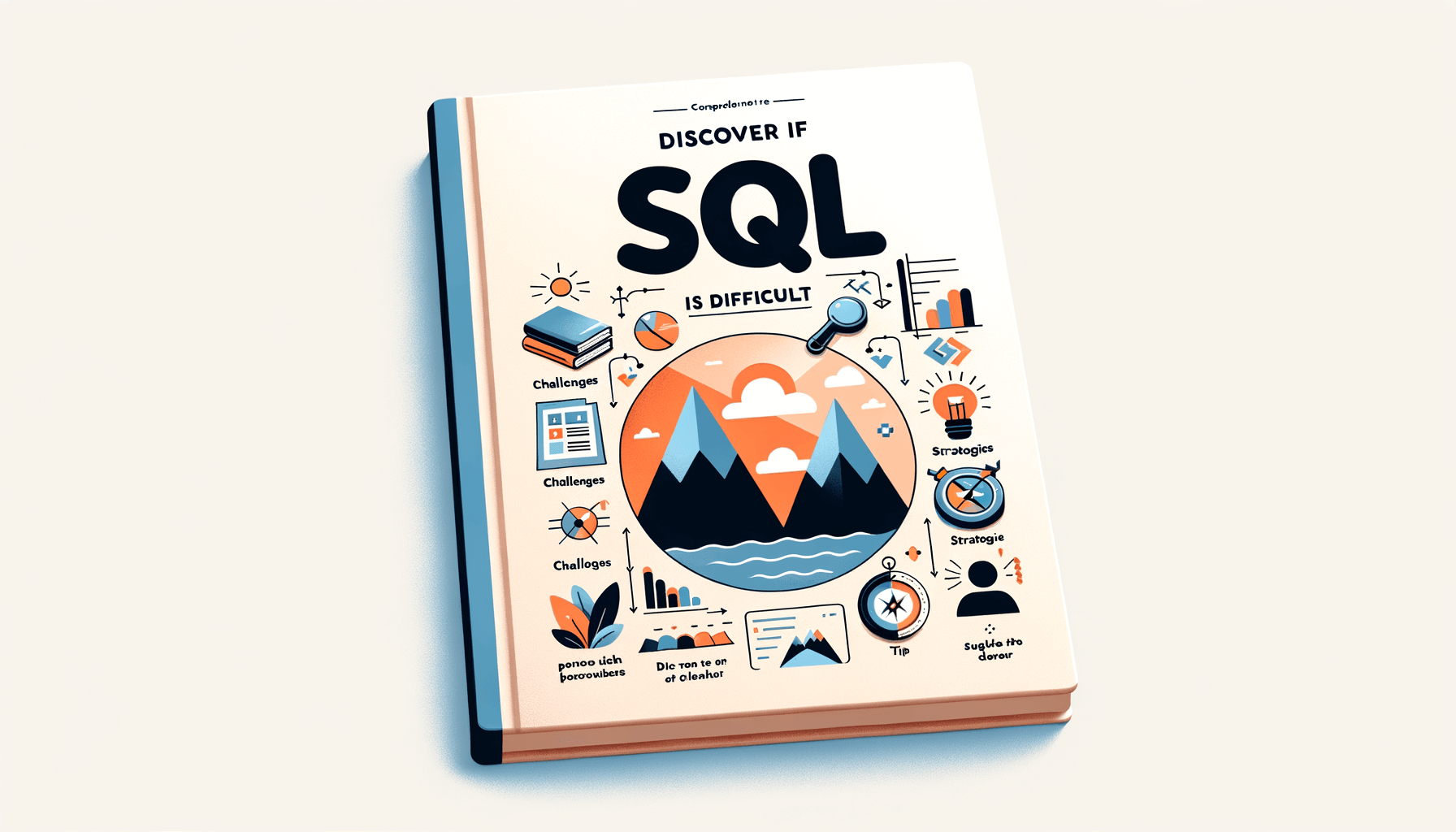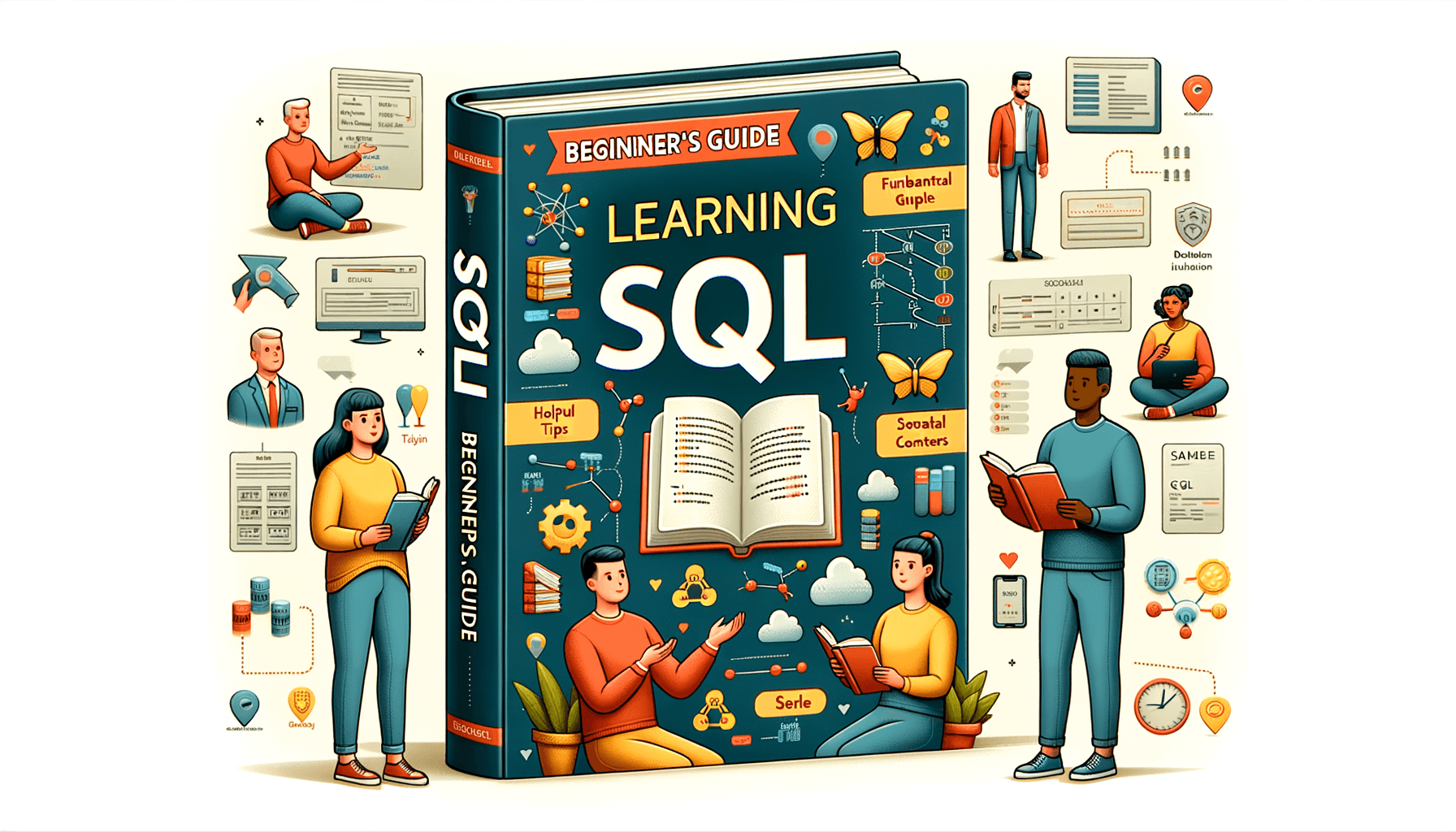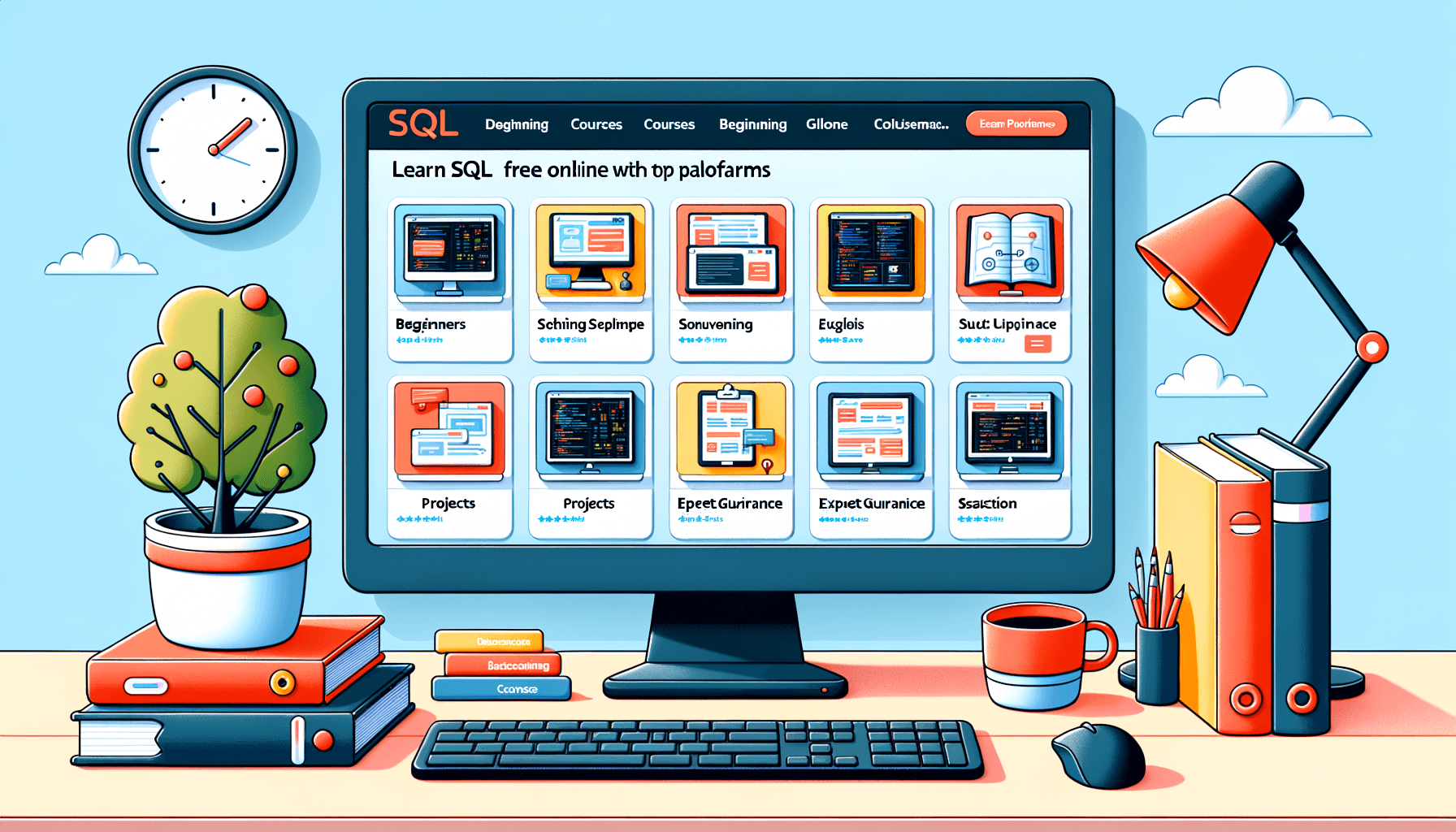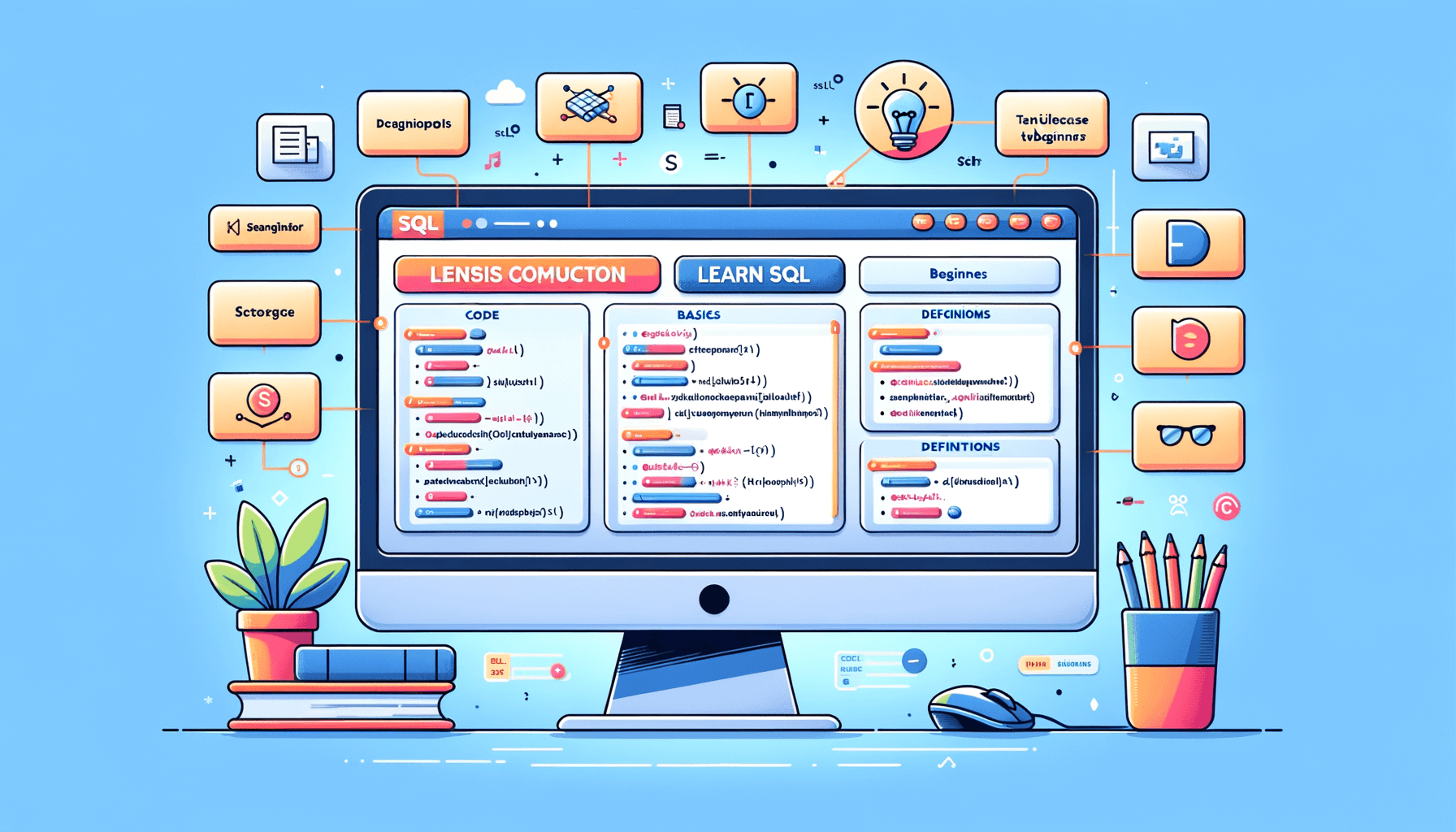A big variety of articles and resources

Is It Difficult to Learn SQL? A Comprehensive Guide for Beginners
 Sia Author and Instructor
Learn SQL
Sia Author and Instructor
Learn SQL
10 minute read
Understanding SQL and Its Importance
What is SQL?
SQL (Structured Query Language) is a language used to manage and manipulate data in relational databases. In today’s data-driven world, SQL is an essential tool for data analysts, developers, and anyone else who works with data. As AI tools and models grow in popularity, so will supporting languages like SQL that work with data.
Why Learn SQL?
SQL is not just a relic of the past. It continues to evolve and adapt to the needs of the modern world. Over the years, this database language has become an industry standard, recognized and used by all major organizations. It's the basic language for working with databases, used daily by market giants such as Google and Facebook for a variety of processes.
Real-World Applications of SQL
A detailed examination of SQL's foundations, syntax, and real-world applications is necessary to fully appreciate the language's intricacy. Relational database management is the focus of SQL, a declarative programming language. Users may execute a variety of tasks with it, such as retrieving, manipulating, and administering data. Its syntax is derived from a collection of functions and commands designed for particular database activities.
Because of its popularity and adaptability, SQL is a necessary skill for everyone dealing with data, including information technology specialists, database designers, analysts of information, and software developers. Its extensive features and capabilities offer strong solutions for handling and analyzing enormous amounts of data, yet its standardized syntax and wide environment of resources and utilities make it reasonably approachable for newcomers.
Common Challenges Faced by Beginners
Learning SQL can be a rewarding experience, but it comes with its own set of challenges. Here are some of the most common difficulties that beginners face:
Abstract Nature of Databases
One of the reasons why beginners might find SQL hard to learn is because of the abstract nature of databases. Understanding how to transform real-world needs into a well-organized database model can be difficult for newbies. This often involves thorough analysis of data structure, linkages, and normalization.
Set-Based Thinking
SQL requires a different mindset compared to procedural programming languages. Instead of thinking in terms of individual steps, you need to think in sets and operations on those sets. This set-based thinking can be challenging to grasp initially but is crucial for mastering SQL.
Overcoming Initial Hurdles
While SQL is generally considered easier to learn than other programming languages, it can still be challenging for beginners. With practice and persistence, these challenges can be overcome. Beginners may find it difficult to master SQL for beginners in data management. However, structured learning paths and consistent practice can make the journey smoother.
Effective Learning Strategies for SQL
Structured Learning Paths
Investigate a range of educational materials to fit your chosen learning style. There are several resources available for teaching SQL, such as collaborative platforms, books, courses, as well as internet tutorials. To strengthen your comprehension, pick materials that include organized learning pathways, practical activities, and real-world examples.
Practice and Persistence
SQL, like every other language for programming or technical ability, takes time and effort to learn. Practice regularly to reinforce your understanding and build confidence. Consistent practice will help you overcome initial hurdles and accelerate your SQL learning with free resources.
Utilizing Online Resources
A plethora of dynamic platforms, documents, courses, and online lectures are available to teach SQL at different ability levels. These tools frequently include organized learning routes, hands-on activities, and examples from real life to help students learn. Master SQL through diverse materials and consistent practice to benefit from job opportunities in data-related fields.
Comparing SQL with Other Programming Languages
SQL vs. Procedural Languages
SQL is a declarative language, which means it focuses on what needs to be done rather than how to do it. This is in contrast to procedural languages like C++ or JavaScript, where the programmer must specify the exact steps to achieve a task. Relational database management is the focus of SQL, allowing users to execute tasks such as retrieving, manipulating, and administering data with simple commands.
Ease of Learning
The good news is that learning SQL is relatively easy. It's a lot simpler than programming languages like C++ or JavaScript, and it's not an overly long process. The majority of the statements are actually regular English words that help the user roughly understand what a query does, without much previous experience. You'll need to put in at least twenty hours of work, although the swift journey to mastering SQL with consistent practice is achievable.
Use Cases and Applications
SQL is widely utilized in the processes of gathering information and analysis from databases. It is the standard language for interfacing with relational database management systems (RDBMS) including MySQL, PostgreSQL, Microsoft SQL Server, Oracle Database, and SQLite. It may be used to create, query, update, and manage databases as well as the tables, views, rankings, and stored procedures that are included inside.
SQL is not just a relic of the past. It continues to evolve and adapt to the needs of the modern world. Over the years, this database language has become an industry standard, recognized and used by all major organizations. It's the basic language for working with databases, used daily by market giants such as Google and Facebook for a variety of processes.
Essential SQL Concepts for Beginners
Basic Syntax and Commands
Understanding the basic syntax and commands of SQL is crucial for beginners. SQL syntax may seem complicated at first, but with practice, it becomes more intuitive. Key commands include SELECT, INSERT, UPDATE, and DELETE, which are used to interact with the data in your database.
Understanding Queries
Queries are the backbone of SQL. They allow you to retrieve and manipulate data from your database. Beginners should focus on learning how to write simple queries and gradually move on to more complex ones involving joins and subqueries. Queries are essential for efficient data management and analysis.
Working with Databases
Since SQL functions inside the framework of relational databases, it is essential to have a basic understanding of concepts like tables, rows, columns, interactions, and normalization. It might initially be difficult for beginners to understand these ideas, but they are fundamental for working with databases effectively.
Embrace the possibilities of SQL for data-driven opportunities. As you progress, the concepts you struggled with initially will start to make more sense.
Resources to Help You Learn SQL
When it comes to mastering SQL, having the right resources can make all the difference. Here are some of the best resources to help you on your journey:
Online Courses and Tutorials
There are many resources available for learning SQL. Here are a few recommendations:
- W3Schools SQL Tutorial: This tutorial provides a comprehensive overview of SQL, from basic concepts to advanced topics.
- SQLZOO Interactive SQL Tutorial: This tutorial uses interactive exercises to teach you SQL.
- Khan Academy SQL Course: This course provides video lessons and interactive exercises on SQL.
Books and Guides
Books can be an excellent way to dive deep into SQL. Some popular choices include:
- "Learning SQL" by Alan Beaulieu
- "SQL for Dummies" by Allen G. Taylor
- "Head First SQL" by Lynn Beighley
Community and Forums
Engaging with the SQL community can provide support and additional learning opportunities. Consider joining:
- Stack Overflow: A great place to ask questions and find answers related to SQL.
- Reddit's r/SQL: A community of SQL enthusiasts sharing knowledge and resources.
- SQLServerCentral: A forum dedicated to SQL Server professionals.
Bold: Mastering SQL requires consistent practice and the right resources. Italics: SQLZOO Interactive SQL Tutorial is a great place to start.
Practical Tips for Mastering SQL
Hands-On Projects
One of the most effective ways to master SQL is by working on hands-on projects. These projects allow you to apply theoretical knowledge in real-world scenarios, helping you understand the practical applications of SQL. Engaging in projects not only solidifies your understanding but also makes learning more enjoyable.
Regular Practice
SQL mastery requires much practice. Allocate specific time for honing your SQL query writing skills and doing database exercises. Begin with easy questions and progressively proceed to more complicated ones as your confidence grows. To gain a deeper knowledge of SQL principles, try out different circumstances and datasets.
Seeking Feedback and Improvement
Feedback is crucial for improvement. Share your SQL queries and projects with peers or mentors to get constructive feedback. This will help you identify areas for improvement and refine your skills. Additionally, participating in community forums can provide valuable insights and different perspectives on solving SQL problems.
Consistent practice and seeking feedback are key to mastering the basics: a comprehensive learn SQL for beginners PDF guide. Essential SQL skills for data management. Practice, learn, and excel in data-related roles with provided resources and tips.
Mastering SQL can open up numerous opportunities in your tech career. To help you on this journey, we've compiled some practical tips that you can start implementing today. For more in-depth learning and personalized guidance, visit our website and explore our comprehensive courses. Don't miss out on the chance to advance your skills and career!
Conclusion
In conclusion, while SQL may present some initial challenges for beginners, it is widely regarded as one of the more accessible programming languages. Its relatively simple syntax and the availability of numerous high-quality learning resources make it an excellent choice for those new to programming and databases. The key to mastering SQL lies in a structured approach, consistent practice, and leveraging the wealth of resources available. Whether you are aiming to become a database administrator, data analyst, or software developer, learning SQL is a valuable investment in your skillset. With dedication and the right guidance, you can overcome the learning curve and harness the power of SQL to manage and analyze data efficiently.
Frequently Asked Questions
Is SQL hard to learn for beginners?
SQL may be difficult for inexperienced programmers and database administrators. However, beginners may progressively increase their SQL abilities and expertise over time with commitment, practice, along with access to high-quality learning resources. Beginning with the fundamentals and proceeding to more complex topics at a manageable pace can assist in shortening the learning curve.
How long will it take to learn SQL?
The time it takes to learn SQL varies depending on your prior experience, the complexity of the tasks you want to perform, and how much time you can dedicate to learning. Generally, with consistent practice, beginners can grasp the basics within a few weeks.
Do I need a specific database system to learn SQL?
No, you do not need a specific database system to learn SQL. SQL is a standardized language, so the basic syntax and commands are consistent across different database systems like MySQL, PostgreSQL, and SQL Server.
Why should I learn SQL?
Learning SQL is valuable because it enables you to work with data in a structured and efficient manner. It’s a fundamental skill for anyone involved in data analysis, database administration, web development, or software engineering.
What are common challenges in learning SQL?
Some common challenges include understanding the abstract nature of databases, adopting set-based thinking, and overcoming initial hurdles. However, with practice and persistence, these challenges can be overcome.
What are effective strategies for learning SQL?
Effective strategies for learning SQL include following structured learning paths, practicing consistently, and utilizing online resources like courses, tutorials, and community forums.
Related Articles

Is It Easy to Learn SQL? A Beginner's Guide to Mastering SQL
10 minute read

Learn SQL Free Online: Your Path to Data Mastery
9 minute read

Learn SQL Language Free: A Comprehensive Tutorial
8 minute read


